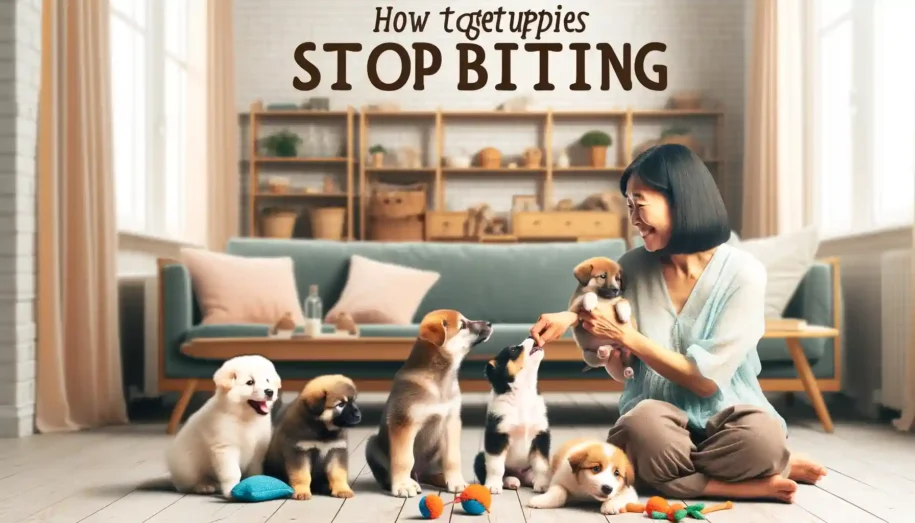
Welcoming a playful pup into your private home is an enjoy packed with pleasure and lovely mischief. However, together with their boundless energy comes the inevitable segment of puppy biting. This natural behavior, while not unusual in younger puppies, can be a problem for puppy owners. Puppies discover the sector with their mouths, but it is critical to educate them the bounds of appropriate conduct early on. This manual ambitions to offer powerful strategies for curtailing this habit, making sure your bushy pal grows right into a properly-mannered person canine. By understanding the reasons at the back of biting and enforcing constant schooling techniques, you could foster a safe and glad environment for each your pup and your own family.
Understanding Puppy Biting
Puppy biting is a typical section in a canine’s improvement. It’s a way for them to discover their surroundings, relieve teething discomfort, and engage in play. Understanding the root causes of this conduct is the first step to effectively dealing with it.
- Teething Relief: Puppies start teething at round three to 4 months vintage. This process can be painful and purpose them to chunk and chew extra.
- Playfulness and Exploration: Puppies use their mouths much like human babies – to study the sector around them. During play, they may now not comprehend the energy of their bite.
- Learning Social Cues: In the wild, puppies learn to moderate their bite power thru interactions with their littermates and mother. Domestic puppies need to study these social cues in their new environment.
Differentiating between playful biting and competitive conduct is crucial. Playful biting is typically accompanied by a relaxed body and wagging tail, while aggressive biting might also contain growling, stiff frame posture, and a direct stare. Recognizing these signs early can assist in addressing the conduct efficiently.
Essential Training Techniques
Training your domestic dog not to chew includes staying power, consistency, and positive reinforcement. Here are some powerful strategies:
- Bite Inhibition Training: Teaching your doggy the sensitivity of human pores and skin is prime. When they chew too hard, set free a gentle yelp or say “Ouch!” in a corporation tone. This mimics the feedback they could acquire from their littermates and teaches them to soften their bite.
- Redirecting to Toys: Whenever your pup starts offevolved to bite, redirect their interest to a bite toy. This no longer most effective discourages biting but additionally enables relieve teething ache.
- Use of Commands: Teach simple commands like “Leave it” or “Stop.” Reward compliance with treats or praise to boost good behavior.
- Time-Outs: If the biting continues, implement a short time-out. Remove your attention or location the doggy in a safe, restricted space for a couple of minutes to chill out.
Consistency is critical in these training strategies. All own family contributors must respond in the identical manner to make sure the doggy learns the regulations.
Creating a Supportive Environment
The surroundings you create for your domestic dog plays a huge position in handling biting conduct.
- Provide Plenty of Chew Toys: Ensure your pup has lots of chew toys. These now not handiest preserve them entertained however also fulfill their urge to bite.
- Regular Playtime: Engage in regular, controlled play sessions. This helps your doggy burn off electricity and reduces the probability of biting out of boredom or extra energy.
- Setting Boundaries: Establish clear boundaries within the house. Teach your pup which areas are off-limits and wherein they could play freely.
Creating a ordinary and a established surroundings facilitates your puppy feel steady and apprehend what is expected of them.
Handling Aggressive Biting Behavior
While most pup biting is playful, it is crucial to understand and cope with signs of aggression early.
- Recognize Aggressive Signs: Growling, snapping, and a stiff frame posture are signs of aggression.
- Avoid Punishment: Avoid physical punishment as it may exacerbate aggression. Instead, attention on wonderful reinforcement and redirection.
- Socialization: Expose your doggy to numerous human beings, animals, and conditions. Proper socialization can lessen worry and tension, not unusual causes of competitive behavior.
- Stay Calm: Maintain a peaceful demeanor. Puppies can select up for your feelings, and your calmness can assist diffuse a hectic state of affairs.
If competitive biting persists, don’t forget seeking advice from a veterinarian or a expert dog teacher.
Seeking Professional Help
If your efforts to reduce biting conduct are unsuccessful, it is really useful to are searching for expert assist. Persistent competitive biting or incapacity to govern biting can be indicative of deeper problems. A professional dog trainer or a behaviorist can offer tailor-made recommendation and education strategies. They can verify the situation from an experienced attitude, discover any underlying reasons of the conduct, and recommend powerful, personalized techniques. In a few instances, a session with a veterinarian is vital to rule out any scientific issues that might be contributing to the conduct.
Conclusion
Training a doggy not to chew is an essential part of their upbringing. It requires endurance, consistency, and a clear know-how of the conduct. By employing chunk inhibition techniques, developing a supportive environment, and the use of fantastic reinforcement, you may manual your puppy toward higher conduct. Remember, early intervention is prime. If demanding situations persist, do not hesitate to are looking for professional help. With time and effort, your puppy will learn to have interaction adequately and gently, making sure a harmonious courting together with your hairy pal for future years.